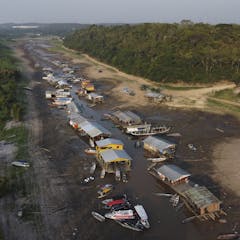
Articles sur Deforestation
Affichage de 21 à 40 de 344 articles

Getting serious about protecting global biodiversity requires not just policy but a revolution in how we talk about, and with, our planet’s forests.

A combination of climate change, a strong El Niño and an insistence on works of enormous impact are contributing to an unprecedented and extremely urgent situation in the region

A new study suggests a radical rejigging of where food is grown. But is such a world even possible?

You might look at the task ahead of weaning ourselves off fossil fuels and despair. But we’ve changed energy sources many times before – and it’s never a straightforward process.

A therapist shares advice for harnessing your stress over climate change and other environmental harms and putting it to work.

REDD+ is a UN program to fight deforestation. But, have local and indigenous communities received their equitable benefits?

The UN ‘30 by 30’ biodiversity strategy aims to set aside 30% of land as protected areas. New research shows these areas do support biodiversity, but big parks also increase it outside their borders.

Plantations of exotic trees from the mid-19th century onwards devastated Indian ecosystems.

Forest fragmentation is causing the deepest and darkest parts of the world’s forests to shrink.

A realistic look at forest management on the Nitassinan of Pessamit, based on data from the Québec government’s forest inventories.

Too much red meat – and especially processed meat – is linked to cancer and heart disease. But moderation is the key – alongside better farming practices

Côte d’Ivoire’s nanosatellite is the first step towards applications that monitor environmental harm and illegal activities and assist in planning for development.

Only fragments of Britain’s “temperate rainforest” remain – here’s some tips to help you identify one when you come across it.

Timber parks, where the paperwork for loads of timber is inspected, can help stem the financial losses from illegal exports.

Deforestation rates are lower in tiger reserves.

The remoteness and small size of old-growth boreal trees should not make us forget their high ecological importance and the many threats they face.

By generating new high-resolution maps, researchers found cocoa plantations were causing far worse forest destruction in West Africa than previously thought.

We know industrial farming needs to change. But regenerative agriculture may not be the transformation our global food system needs.

It’s quite common to see whole Indigenous families on bikes – including pets and tiny children.

Typically, humanitarian concerns are prioritised following a war. But the environment must also get attention so that societies can produce food and goods to rebuild their lives.

